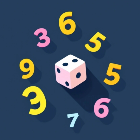
Random Number Generator
Get random numbers for any purposes and scenarios.
Category: Gaming
930 users last week
Key Features
- Random number selection within specified limits
- Supports integer and fractional values
- Suitable for games, contests, and calculations
- Used in educational and creative projects
- Absolutely free
Description
Sometimes, to make a decision, all you need to do is flip a coin or, if you're too indecisive, leave it up to chance. Maybe you've chosen what movie to watch in the evening by simply flipping through a list with your eyes closed and stopping at the first title that catches your eye? Or maybe you and your significant other have tried to decide who will wash the dishes by flipping a coin? These are all great ways to add some fun to your daily routine. Today, we can offer a more technological solution for such decisions. An online random number generator is an excellent tool that allows you to get a random number that does not follow any patterns. From fun and games to serious experiments. Our generator is useful in various fields: from selecting random numbers for raffles to supporting serious scientific research and software development. Perhaps you are looking for a way to raffle a prize among your subscribers - honestly, transparently, without lottery tickets or surveillance cameras. One click - and the winner is known. Quick, easy, and drama-free. Although, admittedly, your fingers may tremble a little at moments like these, especially if the prize is of great value. Or you can use random numbers in everyday life: someone might use them to come up with a password instead of the basic 123, although we have a separate generator for passwords. Someone might choose a wedding date or a note for a new song. As it turns out, randomness can be an excellent co-author. There is also a much more serious side to the entertainment industry. Random numbers play a key role in areas where safety, fairness, and even lives depend on chance. In scientific research, random numbers help model processes that cannot be calculated deterministically. Scientists use random number generators to run thousands of simulations and make predictions based on them. Or in medicine. Imagine a clinical trial of a new drug. How do you choose which volunteers receive the real drug and which receive a placebo? Even in the justice system, where everything should be strictly according to the law, there is room for chance. In some countries, jury members or judges for certain cases are selected at random to avoid bias. Interesting, isn't it? What we tend to consider luck or chance actually becomes the foundation for the most serious decisions. And who would have thought that a small algorithm capable of generating a number from 1 to 100 could be behind a code protecting state secrets or a scientific model explaining the behavior of galaxies? This, by the way, is very similar to our lives. We plan, build routes, draw diagrams, and then something completely different happens. The only question is how to react to it. You can get angry at the wrong number, or you can see it as an opportunity.